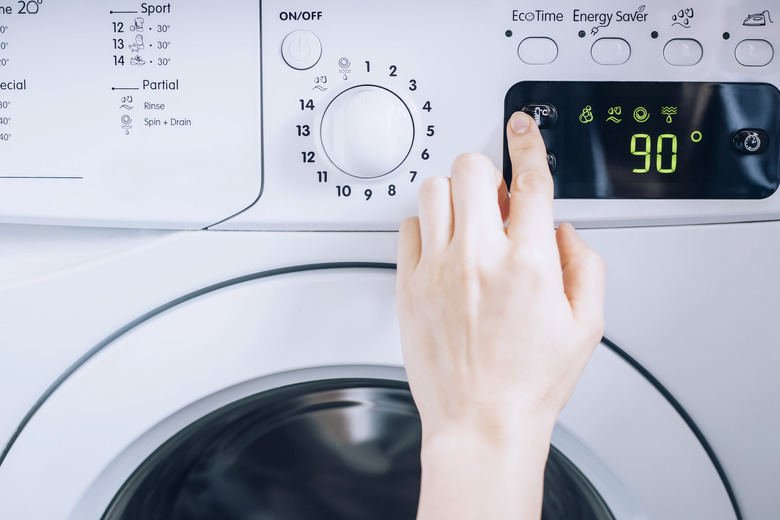7 Mistakes You Might Be Making With Your Washing Machine
Washing machines are a beautiful thing. Not only do they deep clean your beloved garments, when used correctly, they can keep your clothes looking fresh and new.
However, if you're not using your washing machine properly, you can create a whole slew of laundry problems you might not even realize you have. From too much detergent to oversized loads and more, read ahead for seven surprisingly common mistakes you might be making with your washing machine — and what to do instead.
1. You’re not adding the right amount of detergent.
1. You're not adding the right amount of detergent.
If you thought overfilling your cup of laundry detergent was giving your clothes a deeper clean, then it's time to think again. Adding too much detergent makes it harder to rinse the soap out of your clothes. Conversely, too little detergent might not get the dirt and grime out of your stuff. Do your garments a solid and consult your washing machine's manual to find out the specific detergent recommendations — and double check the label on your detergent for suggested amounts — so you don't wind up using too much or too little detergent.
2. You’re not loading your clothes correctly.
2. You're not loading your clothes correctly.
Nothing makes your washing machine work harder than overloading it — that's why laundromats usually have rules about how much stuff you can squeeze into one. On top of wearing down your washing machine's motor, when you load too many items there is less room for your clothing to circulate in the detergent and water, meaning it won't get a proper clean. As a rule of thumb, never fill the washer tub more than three-quarters full in order to avoid the risk of damaging your machine — and having less than clean clothes.
3. You’re using the wrong temperature setting.
3. You're using the wrong temperature setting.
Like it or not, simply sorting your laundry by lights and darks isn't doing you any favors. Turns out that temperature of the water that your garments need to be washed in (cold, warm, or hot) is way more important than their color. Since some clothes can shrink in warm water while others actually need it to get clean, your best bet is to separate your laundry by recommended water temperature and then by lights and darks to avoid bleeding colors and shrinkage.
4. You’re using too much bleach.
4. You're using too much bleach.
Newsflash: Bleach can actually damage for your clothes. Brimming with harsh chemicals, like chlorine, adding bleach to your load of laundry can cause wear and tear to your clothes, and shorten their lifespan exponentially. Fortunately, you can get rid of protein stains, including blood and sweat, without bleach — just boil a big pot of water with a few drops of lemon juice and throw in your stained socks and tees to give them a naturally acidic clean.
5. You’re not zipping up.
5. You're not zipping up.
Post-laundry snags in your clothes are the worst — and you might be causing them. If you're not zipping up your jeans, hoodies, and shirts before throwing them in the washing machine, there's a chance their teeth will damage other items in your load. Take the time to zip up all your zippers while you are sorting your laundry to bypass any unsightly snags on your watch.
6. You’re not leaving the door open after use.
6. You're not leaving the door open after use.
If you're closing the door of your washing machine after every use, you might be the reason it smells funny. The moisture inside of your machine needs time (and air) to evaporate after you run a load, and closing the door too soon can turn the moisture into stinky mildew quickly. Luckily, all you have to do is keep the door open between loads of laundry to ensure your machine stays fresh-smelling and mold-free.
7. You’re not cleaning your washing machine regularly.
7. You're not cleaning your washing machine regularly.
For as clean as it may seem, your washing machine needs to be cleaned as well. Give your washing machine a thorough rinse down by running the wash cycle with an empty load and a cup of vinegar (instead of detergent) at least once every month to kill mold and other foul-smelling bacteria that might cause your clothes to be odorous.
